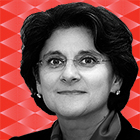This content is from:xinyabo体育app
2015 All-America Research Team: Economics, No. 1: Nancy Lazar
Two and a half years after co-founding Cornerstone Macro, Nancy Lazar claims her first top finish on this lineup, ending Ed Hyman’s reign as America’s No. 1 economist at 35 years.


Total Appearances: 15
Analyst Debut: 2001
Two and a half years after co-founding Cornerstone Macro,Nancy Lazarclaims her first top finish on this lineup, ending Ed Hyman’s reign as America’s No. 1 economist at 35 years. He slips to second place, the position Lazar maintained for the past six years, even as she left ISI Group — the firm she and Hyman launched in 1991 — to set up a macro research shop with three other former ISI colleagues. She previously worked as an analyst at C.J. Lawrence (now part of Deutsche Bank Securities) and holds a bachelor’s degree in economics from Kalamazoo College in Michigan. The 58-year-old researcher impresses clients with “clearly articulated and well-reasoned views and positions,” as one admirer observes, adding that “her volume of output is off the charts.” For the year ahead, Lazar’s headline concern is the decline in China’s economic output. That nation “appears to be experiencing a hard landing, at least in the short term,” she advises. “Chinese growth is slowing. They are dealing with five significant bubbles: credit, investment, stock market margin debt, inventories and multinational company earnings. The unwinding of these is likely to slow growth further.” Moreover, the rapid downshift in expansion has already manifested itself in the form of eroding profits for the country’s industrial companies and multinationals, she notes. At the same time, Beijing’s recent efforts to reinvigorate the world’s second-largest market, largely through monetary stimulus and easier access to margin financing for equity investors, have fallen flat. “We’re forecasting that reported [gross domestic product] growth will slow to 5 percent year-over-year by the fourth quarter of 2015,” says Lazar, “but real economic activity is probably much slower than that and likely to slow further.” Among the consequences of this pullback — a phenomenon shared with the three other BRIC nations (Brazil, Russia and India) — will be “the end of the commodities supercycle” as deflationary pressures take hold, she concludes.
